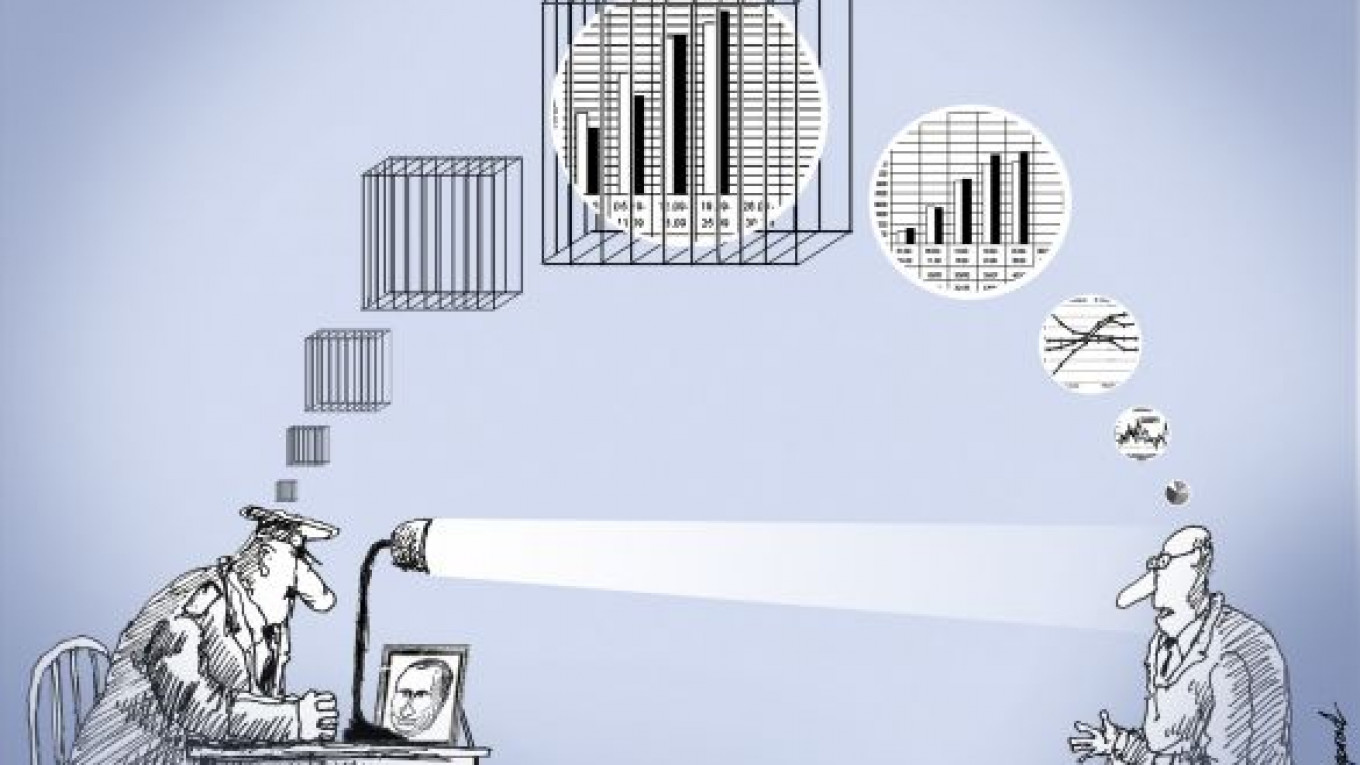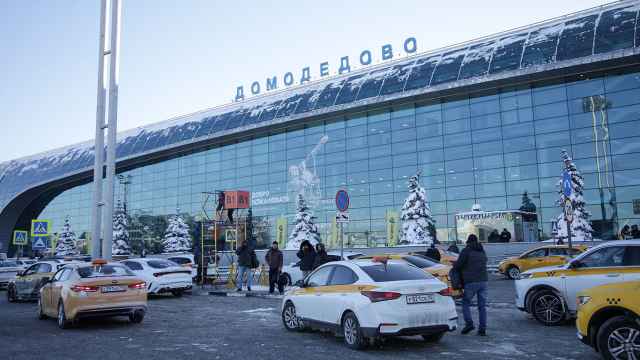Ever since President Vladimir Putin began his third presidential term a year ago, he has relied even more on his Investigative Committee, the Prosecutor General's Office, the Federal Security Service and loyal courts as his primary tools for ruling the country and crushing dissent.
During "Putin 3.0," interrogations, searches and seizures of documents, computers and hard drives have become everyday occurrences, and the number of targets is increasing every day. First, it was opposition leaders and activists. Next, it was a few government ministers and governors who fell out of favor with the Kremlin. Then came nongovernmental organizations, and now it is scholars and specialists who express even the mildest opposition to authorities.
And if this weren't enough, the Chekists can use the recently passed law on treason to make almost any contact with foreigners a criminal offense.
As in the Soviet era, everything foreign is now suspect. Yet the attack on Guriev shows that Putin's regime is even more repressive than the Soviet one.
As in the Soviet era, everything foreign is now suspect — even the overseas contacts of Russia's top economists and scientists. The paranoia of the Chekists has become the main force behind the regime's erratic punitive actions.
Putin's police state operates with total impunity, and the only opposition to this bacchanalia are the indignant cries of a diminishing group of intellectuals and the few remaining liberal media outlets. The courts continue rubber-stamping arrest and search warrants, while the great mass of Russians show little interest in events, if they even know about the state's unprecedented crackdown on dissent.
The worst part is that victims are helpless in the face of Putin's police state. Investigators and prosecutors conduct interrogations, searches and arrests with complete disregard for the law. The Chekists are free to wiretap phones at will, opposition leaders are subjected to a well-planned campaign of intimidation, arrest and trumped-up criminal charges. Meanwhile, servile investigators and courts slap heavy fines on NGOs for not registering as "foreign agents," and thousands of peaceful and law-abiding citizens are forced to sign written pledges not to leave town and are subjected to lengthy interrogations and criminal charges. Investigators arrive at 6 a.m., rouse people out of their beds, frighten their young children and ransack apartments.
The sudden decision by New Economic School rector Sergei Guriev to emigrate to France indicates that Putin's new Oprichnina is incompatible with the country's development. Guriev was moderate in his views and was a member of Prime Minister Dmitry Medvedev's Open Government. The New Economic School, where he served as rector before his forced resignation, was a showcase of Medvedev's "modernization." And at the same time, Guriev openly contributed to Rospil, the anti-corruption project founded by whistleblower Alexei Navalny, criticized the authorities and signed his name to an independent report concluding that the second trial and conviction of former Yukos CEO Mikhail Khodorkovsky was unfounded. After that incident, he and the other signatories of that report were subjected to intimidation, interrogations, searches and seizures by the siloviki.
Guriev was twice interrogated at his office and was told to turn over to authorities all of his private correspondence and e-mails from the past five years. But he is only a witness in the Yukos case and not a defendant, and his private correspondences by phone and e-mail are protected by the Constitution. The authorities hinted to him that they might confiscate his passport and deprive him of the ability to visit his wife and children living in France. Once Guriev realized that the question of his freedom lay exclusively in the hands of thugs who enjoy the complete protection from their superiors in law enforcement agencies and perhaps in the Kremlin, he left the country for good. As Guriev said, "In Russia, you can be deprived of your freedom even if you have done nothing wrong."
Even before Guriev's forced emigration, polls have shown that an increasing number of university students, recent graduates and people in their 20s and 30s want to emigrate. Meanwhile, capital flight is reaching record levels, and the economy has come to a near standstill.
The fact that prominent scholars are now being subjected to repressive measures for voicing their opinions underscores a new and alarming aspect to the current Kremlin campaign against dissent. Even the Soviet authorities recognized the importance that scholars and scientists held for the economy and national security and thus allowed them far greater liberties than average citizens. Prominent Soviet scholars were a privileged caste, and even when they expressed somewhat liberal views, Soviet leaders after Stalin were willing to overlook these "transgressions." Yet with regard to Guriev and others, Putin's regime has shown that it is even more repressive than the Soviet one. As for Medvedev, he offered no support to his former adviser and supporter, saying, "Anyone who wants to leave is free to go."
The new wave of Russian emigration is qualitatively different from that of the 1990s. After the Soviet collapse, Russians emigrated because of the chaos, economic insecurity, widespread poverty and high level of organized crime. Now the most innovative and creative Russians are emigrating because of the complete lawlessness and widespread abuses of the siloviki against law-abiding citizens. Under such conditions, all of the government's ambitious plans for innovation and modernization are meaningless.
When Ivan the Terrible instituted his infamous Oprichnina in Muscovy of the 16th century, nearly one-fourth of Russians fled the country in fear, thus leading to the country's defeat in the Livonian War and triggering the period known as the Time of Troubles. Under Putin's police state, we are headed straight for another Time of Troubles in the best- case scenario, if not a total collapse of the Russian state.
Vladimir Ryzhkov, a State Duma deputy from 1993 to 2007, hosts a political talk show on Ekho Moskvy radio and is a co-founder of the opposition RP-Party of People's Freedom.
A Message from The Moscow Times:
Dear readers,
We are facing unprecedented challenges. Russia's Prosecutor General's Office has designated The Moscow Times as an "undesirable" organization, criminalizing our work and putting our staff at risk of prosecution. This follows our earlier unjust labeling as a "foreign agent."
These actions are direct attempts to silence independent journalism in Russia. The authorities claim our work "discredits the decisions of the Russian leadership." We see things differently: we strive to provide accurate, unbiased reporting on Russia.
We, the journalists of The Moscow Times, refuse to be silenced. But to continue our work, we need your help.
Your support, no matter how small, makes a world of difference. If you can, please support us monthly starting from just $2. It's quick to set up, and every contribution makes a significant impact.
By supporting The Moscow Times, you're defending open, independent journalism in the face of repression. Thank you for standing with us.
Remind me later.








